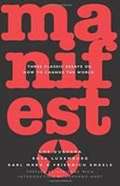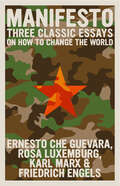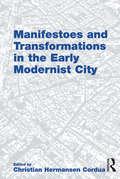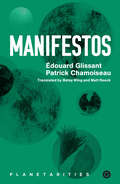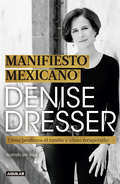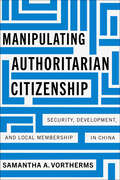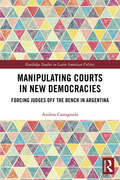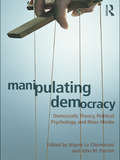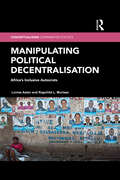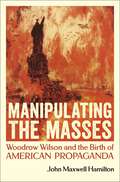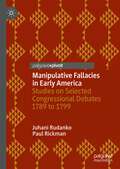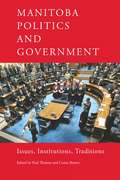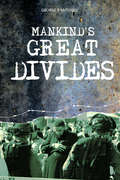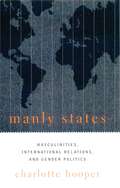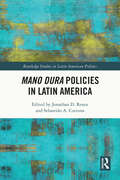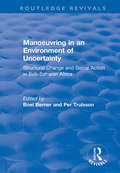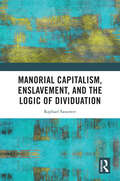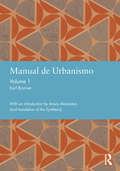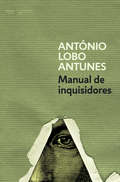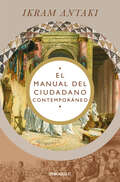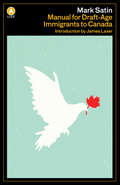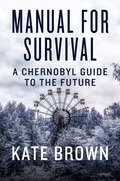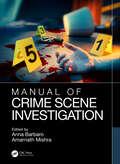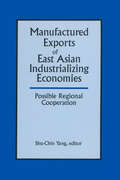- Table View
- List View
Manifesto: Three Classic Essays on How to Change the World
by Friedrich Engels Karl Marx Ernesto Che Guevara Rosa Luxemburg"Let's be realists, let's dream the impossible." Che Guevara's words summarize the radical vision of the four famous rebels presented in this book: Marx and Engels' "Communist Manifesto," Rosa Luxemburg's "Reform or Revolution" and Che Guevara's "Socialism and Humanity." Far from being lifeless historical documents, these manifestos for revolution will resonate with a new generation also seeking a better world. "The world described by Marx and Engels... is recognizably the world we live in 150 years later.
Manifesto: Three Classic Essays on How to Change the World (The Che Guevara Library)
by Friedrich Engels Karl Marx Ernesto Che Guevara Rosa LuxemburgThe three texts this book, all written in vastly different eras —The Communist Manifesto (1848) by Marx and Engels, Reform or Revolution (1899) by Rosa Luxemburg and Socialism and Man in Cuba (1965) by Ernesto Che Guevara—illuminate socialist ideas of the 19th and 20th centuries.For a new generation of activists, these are classic revolutionary writings by four famous rebels, including The Communist Manifesto by Karl Marx and Friedrich Engels; Reform or Revolution by Rosa Luxemburg; and Che Guevara&’s Socialism and Man in Cuba. Includes an introduction by Cuban Marxist intellectual Armando Hart and a preface by US radical poet Adrienne Rich. The essays in this book, Manifesto, were written by three relatively young people—Karl Marx when he was 30, Rosa Luxemburg at 27, Che Guevara at the age of 37. Born into different historical moments and different generations, they shared an energy of hope, an engagement with history, a belief that critical thinking must inform action, and a passion for the world and its human possibilities. Here are urgent conversations from the past that are still being carried on, among new voices, throughout the world.
Manifestoes and Transformations in the Early Modernist City
by Christian Hermansen CorduaThe industrialization of the nineteenth-century European city facilitated developing conceptions of the model city, and allowed for large scale urban transformations. The urban discourse in the latter half of the nineteenth century was consequently dominated by a dialectic exchange between the ideal and the practical, a debate played out in the formation of the modern metropolis. Manifestoes and Transformations is the first work to deal with urban utopias and their relationship with actual urban interventions. Bringing together a carefully chosen, wide-ranging team of experts, the book provides a broad, contextual exploration of the ideas and urban practices which are the foundations of our conception of the contemporary city. As such, it is a valuable resource for students interested in the formation of the modernist city.
Manifestos (Goldsmiths Press / Planetarities)
by Patrick Chamoiseau Edouard GlissantThe collected manifestos of Édouard Glissant and Patrick Chamoiseau: for a postcolonial response to planetary crisis.Manifestos brings together for the first time in English the manifestos written by Édouard Glissant and Patrick Chamoiseau between 2000 and 2009. Composed in part in the aftermath of Barack Obama&’s election in 2008, the texts resonate with the current context of divided identities and criticisms of multiculturalism. The individual texts grapple with concrete historical and political moments in France, the Caribbean, and North America. Across the manifestos, as well as two collectively signed op-eds, the authors engage with socio-political aspects of climate catastrophe, resource extraction, toxicity, and neocolonialism. Throughout the collection, Glissant and Chamoiseau engage with key themes articulated through their poetic vocabulary, including Relation, globalization, globality (mondialité), anti-universalism, métissage, the tout-monde (&“whole-world&”) and the tout-vivant (&“all-living,&” including the relationship of humans to each other and &“nature&”), créolité and the creolization of the world, and the liberation from community assignations in response to individualism and neoliberal societies. Translated as the first volume in the Planetarities series with Goldsmiths Press, the themes of Manifestos resonate with the planetary as they work in response to contemporary forms of (economic) globalization, western capitalism, identity politics, and urban, digital and cosmic ecosystems, as well as the role of the poet-writer. A distinguishing feature of this publication is its interventional aspect, which prioritizes engaged scholarship and practice while demonstrating the relevance of the poetic in response to the urgencies of planetary crisis.
Manifiesto mexicano: Cómo perdimos el rumbo y cómo recuperarlo
by Denise DresserUna lectura obligada para ciudadanos críticos y propositivos. Este es un libro lleno de rabia y amor perro por el México maltrecho que debemos rescatar. Es una crónica del hartazgo, del enojo con la cleptocracia que se rota en el poder, con los privilegios inmerecidos de los cómodamente apoltronados en la punta de la pirámide. Un país atorado en la desesperanza, en el desamparo, sofocado por la corrupción, amenazado por la violencia, sin soluciones fáciles. Con el implacable rigor que la distingue, Denise Dresser hace un corte de caja de los últimos tiempos, los años del desencanto. La Peñastroika perdida, la cuatitud corrosiva, la vetocracia viva, el pacto de impunidad y cómo transitamos de la dictadura perfecta al pillaje perfecto. Por sus páginas desfilan las prácticas y las historias que han trastocado la transición democrática; sus líneas repasan los síntomas semanales de la descomposición como la "Casa Blanca", el escándalo de Odebrecht, la llamada "Estafa Maestra", los fiscales carnales, las instituciones disfuncionales y la partidocracia rapaz. Frontal y reveladora, la autora narra cómo nos convertimos en un país de fosas, de desaparecidos, de ausentes. Refuta las "verdades históricas" de Ayotzinapa y Tanhuato y Apatzingán, y contabiliza los costos de pelear la misma guerra contra el narcotráfico, pero con peores resultados. Ante este deterioro, apunta las batallas que faltan por ganar: por las mujeres, por los derechos pisoteados, por los periodistas, por la libertad de expresión, por la paz. Manifiesto mexicano es un llamado a ser sujetos desobedientes, a disentir y construir, a "bullear" a quienes gobiernan para que lo hagan mejor. Es una apuesta a la remodelación institucional, a la rendición de cuentas, a los contrapesos, a la democracia, gobierne quien gobierne. Es una convocatoria para componer lo que echamosa perder, y alcanzar lo que quedó como una simple aspiración: un sistema político y económico que funcione para los ciudadanos y no sólo para la clase política. Algo verdaderamente ciudadano. Algo nuestro.
Manipulating Authoritarian Citizenship: Security, Development, and Local Membership in China (Studies of the Walter H. Shorenstein Asia-Pacific Research Center)
by Samantha A. VorthermsThe redistribution of political and economic rights is inherently unequal in autocratic societies. Autocrats routinely divide their populations into included and excluded groups, creating particularistic citizenship through granting some groups access to rights and redistribution while restricting or denying access to others. This book asks: why would a government with powerful tools of exclusion expand access to socioeconomic citizenship rights? And when autocratic systems expand redistribution, whom do they choose to include? In Manipulating Authoritarian Citizenship, Samantha A. Vortherms examines the crucial case of China—where internal citizenship regimes control who can and cannot become a local citizen through the household registration system (hukou)—and uncovers how autocrats use such institutions to create particularistic membership in citizenship. Vortherms shows how local governments explicitly manipulate local citizenship membership not only to ensure political security and stability, but also, crucially, to advance economic development. Vortherms demonstrates how autocrats use differentiated citizenship to control degrees of access to rights and thus fulfill the authoritarian bargain and balance security and economic incentives. This book expands our understanding of individual-state relations in both autocratic contexts and across a variety of regime types.
Manipulating Courts in New Democracies: Forcing Judges off the Bench in Argentina (Routledge Studies in Latin American Politics)
by Andrea CastagnolaWhen can the Executive manipulate the composition of a Court? What political factors explain judicial instability on the bench? Using original field data from Argentina's National Supreme Court and all twenty-four Provincial Supreme Courts, Andrea Castagnola develops a novel theory to explain forced retirements of judges. She argues that in developing democracies the political benefits of manipulating the court outweigh the costs associated with doing so. The instability of the political context and its institutions causes politicians to focus primarily on short-term goals and to care mostly about winning elections. Consequently, judiciaries become a valuable tool for politicians to have under their control. Contrary to the predictions of strategic retirement theory, Castagnola demonstrates that there are various institutional and non-institutional mechanisms for induced retirement which politicians have used against justices, regardless of the amount of support their party has in Congress. The theoretical innovations contained herein shed much needed light on the existing literature on judicial politics and democratization. Even though the political manipulation of courts is a worldwide phenomenon, previous studies have shown that Argentina is the theory-generating case for studying manipulation of high courts.
Manipulating Democracy: Democratic Theory, Political Psychology, and Mass Media
by Wayne Le CheminantManipulation is a source of pervasive anxiety in contemporary American politics. Observers charge that manipulative practices in political advertising, media coverage, and public discourse have helped to produce an increasingly polarized political arena, an uninformed and apathetic electorate, election campaigns that exploit public fears and prejudices, a media that titillates rather than educates, and a policy process that too often focuses on the symbolic rather than substantive. Manipulating Democracy offers the first comprehensive dialogue between empirical political scientists and normative theorists on the definition and contemporary practice of democratic manipulation. This impressive array of distinguished scholars—political scientists, philosophers, cognitive psychologists, and communications scholars—collectively draw out the connections between competing definitions of manipulation, the psychology of manipulation, and the political institutions and practices through which manipulation is seen to produce a tightly-knit exploration of an issue at the heart of democratic politics.
Manipulating Political Decentralisation: Africa's Inclusive Autocrats (Conceptualising Comparative Politics)
by Ragnhild L. Muriaas Lovise AalenCan autocrats establish representative subnational governments? And which strategies of manipulation are available if they would like to reduce the uncertainty caused by introducing political decentralisation? In the wake of local government reforms, several states across the world have introduced legislation that provides for subnational elections. This does not mean that representative subnational governments in these countries are all of a certain standard. Political decentralisation should not be confused with democratisation, as the process is likely to be manipulated in ways that do not produce meaningful avenues for political participation and contestation locally. Using examples from Africa, Lovise Aalen and Ragnhild L. Muriaas propose five requirements for representative subnational governments and four strategies that national governments might use to manipulate the outcome of political decentralisation. The case studies of Ethiopia, Malawi, South Africa, and Uganda illustrate why autocrats sometimes are more open to competition at the subnational level than democrats. Manipulating Political Decentralisation provides a new conceptual tool to assess representative subnational governments' quality, aiding us in building theories on the consequences of political decentralisation on democratisation.
Manipulating the Masses: Woodrow Wilson and the Birth of American Propaganda
by John Maxwell HamiltonWinner of the Goldsmith Book Prize by the Harvard Shorenstein Center on Media, Politics and Public PolicyManipulating the Masses tells the story of the enduring threat to American democracy that arose out of World War I: the establishment of pervasive, systematic propaganda as an instrument of the state. During the Great War, the federal government exercised unprecedented power to shape the views and attitudes of American citizens. Its agent for this was the Committee on Public Information (CPI), established by President Woodrow Wilson one week after the United States entered the war in April 1917.Driven by its fiery chief, George Creel, the CPI reached every crevice of the nation, every day, and extended widely abroad. It established the first national newspaper, made prepackaged news a quotidian aspect of governing, and pioneered the concept of public diplomacy. It spread the Wilson administration’s messages through articles, cartoons, books, and advertisements in newspapers and magazines; through feature films and volunteer Four Minute Men who spoke during intermission; through posters plastered on buildings and along highways; and through pamphlets distributed by the millions. It enlisted the nation’s leading progressive journalists, advertising executives, and artists. It harnessed American universities and their professors to create propaganda and add legitimacy to its mission.Even as Creel insisted that the CPI was a conduit for reliable, fact-based information, the office regularly sanitized news, distorted facts, and played on emotions. Creel extolled transparency but established front organizations. Overseas, the CPI secretly subsidized news organs and bribed journalists. At home, it challenged the loyalty of those who occasionally questioned its tactics. Working closely with federal intelligence agencies eager to sniff out subversives and stifle dissent, the CPI was an accomplice to the Wilson administration’s trampling of civil liberties.Until now, the full story of the CPI has never been told. John Maxwell Hamilton consulted over 150 archival collections in the United States and Europe to write this revealing history, which shows the shortcuts to open, honest debate that even well-meaning propagandists take to bend others to their views. Every element of contemporary government propaganda has antecedents in the CPI. It is the ideal vehicle for understanding the rise of propaganda, its methods of operation, and the threat it poses to democracy.
Manipulative Fallacies in Early America: Studies on Selected Congressional Debates 1789 to 1799
by Juhani Rudanko Paul RickmanThis book implements a new approach to the study of manipulative tactics in selected Congressional debates in the early history of the United States, highlighting the ways in which language can be used to manipulate an audience. The identification and analysis of different informal fallacies is central in the approach adopted by the authors, and they privilege the role of covert intentions as a frequent ingredient of manipulation. They also show how different speakers can use different subtypes of the same fallacy in a debate, and investigate the tension between the policy preferences and goals of politicians, and existing laws. The book has been written without jargon, all concepts and terminology from the field of linguistic pragmatics are clearly defined, and it is accessible to the interested layperson wishing to become familiar with manipulative techniques in political rhetoric.
Manitoba Politics and Government: Issues, Institutions, Traditions
by Paul G. Thomas Curtis BrownManitoba has always been a province in the middle, geographically, economically, and culturally. Lacking Quebec’s cultural distinctiveness, Ontario’s traditional economic dominance, or Alberta’s combustible mix of prairie populism and oil wealth, Manitoba appears to blend into the background of the Canadian family portrait. But Manitoba has a distinct political culture, one that has been overlooked in contemporary political studies.Manitoba Politics and Government brings together the work of political scientists, historians, sociologists, economists, public servants, and journalists to present a comprehensive analysis of the province’s political life and its careful “mutual fund model” approach to economic and social policy that mirrors the steady and cautious nature of its citizens. Moving beyond the Legislature, the authors address contemporary social issues like poverty, environmental stewardship, gender equality, health care, and the province’s growing Aboriginal population to reveal the evolution of public policy in the province. They also examine the province’s role at the intergovernmental and international level.Manitoba Politics and Government is a rich and fascinating account of a province that strives for the centre, for the delicate middle ground where individualism and collectivism overlap, and where a multitude of different cultures and traditions create a highly balanced society.
Mankind's Great Divides
by George R. MitchellBorders. Bridges. Barbed wire.George Mitchell details his visits to some of the world’s most disputed and undefined places. He explores current and historical conflicts and the reverberations which are manifest in the walls and fences; the huge physical divides that are only growing taller with the increasing mental divides of the people on either side.From Israel to Kosovo to Ireland, Mitchell interviews people from both sides of these great divides, exploring the turbulent dynamics of ‘us’ and ‘them’ relationships.Broaching such topics as politics, nationalism, religion and immigration, the frustrating realisation throughout is that, ‘if you take away flags and religious symbols, you are left with one thing: people. Just ordinary people.’ (p77)From being interrogated to tap dancing at a border crossing, Mitchell offers his own experiences of these divides along with a collection of his own eye-opening photographs.
Manly States: Masculinities, International Relations, and Gender Politics
by Charlotte HooperMuch has been written on how masculinity shapes international relations, but little feminist scholarship has focused on how international relations shape masculinity. Charlotte Hooper draws from feminist theory to provide an account of the relationship between masculinity and power. She explores how the theory and practice of international relations produces and sustains masculine identities and masculine rivalries.This volume asserts that international politics shapes multiple masculinities rather than one static masculinity, positing an interplay between a "hegemonic masculinity" (associated with elite, western male power) and other subordinated, feminized masculinities (typically associated with poor men, nonwestern men, men of color, and/or gay men). Employing feminist analyses to confront gender-biased stereotyping in various fields of international political theory—including academic scholarship, journals, and popular literature like The Economist—Hooper reconstructs the nexus of international relations and gender politics during this age of globalization.
Mano Dura Policies in Latin America (Routledge Studies in Latin American Politics)
by Jonathan D. Rosen Sebastián A. CutronaLeading scholars and policy analysts from around the Americas come together to untangle the factors that have fuelled the implementation of mano dura politics, their rising popularity, and impacts across nine widely heterogeneous countries in Latin America. Beginning with a discussion on the concept of mano dura, the editors move to survey various theoretical approaches to punitivism, and later review of the empirical research evaluating different drivers behind the adoption of tough on crime policies. Since hard-line initiatives often have consequences beyond the general goal of reducing violence, they then analyze the impacts of these policing strategies on crime rates and different democratic institutions. Country chapters on Mexico, El Salvador, Honduras, Guatemala, Colombia, Ecuador, Bolivia, Brazil, and Argentina follow a common thematic structure to answer the following questions: What are some of the trends in gangs, organized crime, and violence? How have governments responded to combat crime and violence? What factors have fuelled the implementation of mano dura policies? Why are mano dura policies popular? What have the consequences of these policies been? Mano Dura Policies in Latin America is essential reading to students of Latin American studies, political science, public policy, and criminal justice. It will also interest scholars working on drug trafficking, organized crime, and violence in Latin America.
Manoeuvring in an Environment of Uncertainty: Structural Change and Social Action in Sub-Saharan Africa (Routledge Revivals)
by Boel Berner Per TrulssonThis title was first published in 2000. Recent years have seen tremendous economic and political changes in Sub-Saharan Africa. The contributors to this volume focus on the pressing problem of how actors in their everyday life, political and social action handle uncertainty. With the help of rich empirical material from different countries in Sub-Saharan Africa, the authors try to understand how actors react, manoeuver, organize and make their actions meaningful in an environment characterized by unpredictability and change.
Manorial Capitalism, Enslavement, and the Logic of Dividuation
by Raphael SassowerManorial Capitalism, Enslavement, and the Logic of Dividuation proffers three perspectives on the plantation slave economy of the Antebellum South. The first explores the paternal function as exemplified in the structural authority of the lord of the manor both symbolically and operationally. This figure of masculine authority persisted from the Medieval period to orchestrate what is called here Manorial Capitalism. The second examines the exploitation and alienation that epitomize the logic of capitalism from the plantation economy to the present. And the third deploys retroactively the logic of dividuation to the plantation, a logic that draws its inspiration from neoliberal financial capitalism as well as from anthropological accounts (which distinguish the dividual from the Cartesian-Kantian individual). This book argues that reducing individuals to dividuated components continues to enable a dehumanizing capitalist mindset to fixate on abstracted labor power rather than seeing laboring individuals.
Manual de Urbanismo: Volume 1 (Studies in International Planning History)
by Karl BrunnerUnlike European countries where the consolidation of town planning was based on legislative reforms, Latin America’s urbanismo mainly stemmed from urban plans for national capitals and metropolises. Austrian academic and planner Karl Brunner was hired in Chile, Colombia and Panama from the late 1920s to advise in the professional and academic domains, marking a shift from the so-called École Française d’Urbanisme (EFU) of Haussmannesque descent towards the Austrian-German Städtebau, While coordinating the municipal office and plan for Bogotá, Brunner translated his Manual de Urbanismo – the first textbook published in Latin America about the new discipline and the first to incorporate examples from local cities. Based on his 1924 course at Vienna’s National Faculty of Architecture Brunner’s Manual emphasized the ‘scientific system’ of the discipline. Brunner was the most influential figure of his time in the urban planning of the region, but has become overshadowed by Le Corbusier's and CIAM’s prevailing influence after the Second World War. Complete with a supporting introduction written by Arturo Almandoz, this volume includes the full copy of the original Manual de Urbanismo with an English translation of the synthesis. Further materials, including an extract of Karl Brunner's "Problemas actuales de urbanización" and an accompanying English translation of the text can be accessed at www.routledge.com/9781138778573
Manual de inquisidores
by António Lobo AntunesUna sólida y magistral novela sobre el transcurso interno de la dictadura, de cualquier dictadura... Una dictadura concreta, la del profesor Salazar, instrumento literario de otros autores portugueses, como Cardoso Pires, da pie a Lobo Antunes para construir una sólida y magistral novela sobre el transcurso interno de la dictadura, de cualquier dictadura. A través de los despojos de la memoria de una caterva impagable de personajes -amantes, colegas, empresarios corruptos, el médico de la policía política, viejos militares descontentos-, que se relacionan con un ministro del dictador, una prosa magistral -y extraordinariamente musical- va llenando al lector de una indignación profunda que le hará reflexionar sobre el poder, sobre el poder del Estado, sobre los estados del poder. «Yo querría que mis libros recrearan la vida tal cual es, que renovaran el arte de la novela, que fueran espejos en los que se reflejaran nuestras grandes miserias y nuestras pequeñas grandezas...» Reseña:«obo Antunes cartografía Portugal como si estuviese examinando a un paciente en una mesa de operaciones.»The New Yorker
Manual del ciudadano contemporáneo
by Ikram AntakiUna reflexión sobre la vida civil y los avances democráticos, motivada por un profundo humanismo y alumbrada por un agudo pensamiento crítico. >Dimos lugar y respeto al trabajo, y entendimos que el conformismo puede disfrazarse de revolución.>>Un día nos pusimos a construir una civilización original y tolerante, y dejamos de utilizar como bandera deshecha aquella que otros, en el pasado, hicieron...>>-Ikram Antaki El manual del ciudadano contemporáneo busca realizar este hermoso sueño.
Manual for Draft-Age Immigrants to Canada
by Mark SatinIn print for the first time since 1971, Manual for Draft-Age Immigrants to Canada has once again become relevant in a time of major political upheaval in the United States of America.First published in 1968 by House of Anansi Press, the Manual for Draft-Age Immigrants to Canada was a handbook for Americans who refused to serve as draftees in the Vietnam War and were considering immigrating to Canada. Conceived as a practical guide with information on the process, the Manual also features information on aspects of Canadian society, touching on topics like history, politics, culture, geography and climate, jobs, housing, and universities.The Manual went through several editions from 1968–71. Today, as Americans are taking up the discussion of immigration to Canada once again, it is an invaluable record of a moment in our recent history.
Manual for Survival: A Chernobyl Guide To The Future
by Kate BrownA chilling exposé of the international effort to minimize the health and environmental consequences of nuclear radiation in the wake of Chernobyl. Dear Comrades! Since the accident at the Chernobyl power plant, there has been a detailed analysis of the radioactivity of the food and territory of your population point. The results show that living and working in your village will cause no harm to adults or children. So began a pamphlet issued by the Ukrainian Ministry of Health—which, despite its optimistic beginnings, went on to warn its readers against consuming local milk, berries, or mushrooms, or going into the surrounding forest. This was only one of many misleading bureaucratic manuals that, with apparent good intentions, seriously underestimated the far-reaching consequences of the Chernobyl nuclear catastrophe. After 1991, international organizations from the Red Cross to Greenpeace sought to help the victims, yet found themselves stymied by post-Soviet political circumstances they did not understand. International diplomats and scientists allied to the nuclear industry evaded or denied the fact of a wide-scale public health disaster caused by radiation exposure. Efforts to spin the story about Chernobyl were largely successful; the official death toll ranges between thirty-one and fifty-four people. In reality, radiation exposure from the disaster caused between 35,000 and 150,000 deaths in Ukraine alone. No major international study tallied the damage, leaving Japanese leaders to repeat many of the same mistakes after the Fukushima nuclear disaster in 2011. Drawing on a decade of archival research and on-the-ground interviews in Ukraine, Russia, and Belarus, Kate Brown unveils the full breadth of the devastation and the whitewash that followed. Her findings make clear the irreversible impact of man-made radioactivity on every living thing; and hauntingly, they force us to confront the untold legacy of decades of weapons-testing and other nuclear incidents, and the fact that we are emerging into a future for which the survival manual has yet to be written.
Manual of Crime Scene Investigation
by Anna Barbaro Amarnath MishraOver the past several years, myriad manuals on crime scene investigations have been published with each focusing on select, or partial, aspects of the investigation. Crime scene investigation, done right, is a multi-faceted process that requires various forms of evidence to be collected, examined, and analyzed. No book available has addressed procedures to present global best practices by assembling a collection of international experts to address such topics. Manual of Crime Scene Investigation is a comprehensive collaboration of experts writing on their particular areas of expertise as relates to crime scenes, evidence, and crime scene investigation. The book outlines best practices in the field, incorporating the latest technology to collect, preserve, and enhance evidence for appropriate analysis. Various types of forensic evidence are addressed, covering chain of custody, collection, and utility of such evidence in casework, investigations, and for use in court. The approach, and use of international contributor experts, will appeal to a broad audience and be of use to forensic practitioners, and the forensic science community worldwide. Key features: • Assembles an international team of contributing author experts to present the latest developments in their crime scene field of specialty • Examines global best practices and what are consistently the most reliable tactics and approach to crime scene evidence collection, preservation, and investigation • Provides numerous photographs and diagrams to clearly illustrate chapter concepts Manual of Crime Scene Investigation serves as a vital resource to professionals in police science and crime scene investigations, private forensic institutions, and academics researching how better real-world application of techniques can improve the reliability and utility of evidence upon forensic and laboratory analysis.
Manual on Fiscal Transparency
by International Monetary FundA report from the International Monetary Fund.
Manufactured Exports of East Asian Industrializing Economies and Possible Regional Cooperation
by Shu-Chin YangProviding an examination of civil-military relations in China, this book reflects the changes taking place in Chinese society and their impact on the civil-military dynamic. It explores issues, such as the impact of AIDS, the defense budget, the emerging dynamic between the military and China's leadership, the role of the militia, and more.
